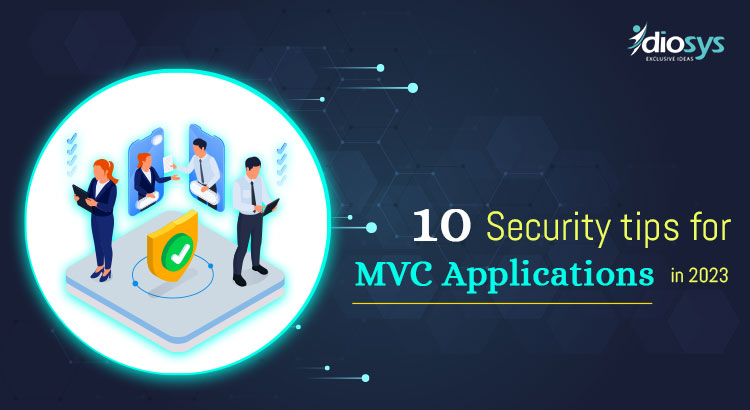10 security tips for MVC applications in 2023
Model-view-controller or MVC is an architecture for web app development. As one of the most popular architectures of app development frameworks, it ensures multiple advantages to the developers. If you are planning to create an MVC-based web app solution for your business, you must have known about the security features of this architecture from your web development agency. Yes, MVC architecture not only ensures the scalability of applications but also a high level of security. And that’s the reason so many web apps are being developed with this architecture. But, if you are looking for ways to strengthen the security features of your MVC app further, you need to know some useful tips.
To help you in this task, we are sharing our 10 security tips for MVC applications in 2023! Read on till the end and apply these tips easily to ensure high-security measures in your app.
1. SQL Injection: Every business has some confidential data in their app, which needs optimum security measures. SQL Injection is a great threat to security measures as it can steal confidential data through SQL codes. You need to focus on the prevention of SQL injection with parameterized queries, storing encrypted data, inputs validation etc.
2. Version Discloser: Version information can also be dangerous for your business data as it provides hackers with your specific version information. Accordingly, they can attempt to attack your app development version and become successful. Hence, you need to hide the information such as the server, x-powered-by, x-sourcefiles and others.
3. Updated Software: Old, un-updated software can be the reason for a cyber attack. The MVC platforms out there comprise security features that keep on updating. If you also update your MVC platform from time to time, the chances of a cyber attack will be minimized. You can search for the latest security updates at the official sites.
4. Cross-Site Scripting: The authentication information and login credentials of applications are always vulnerable elements that should be protected. Cross-Site Scripting is one of the most dangerous attempts to steal this information. Hence, you need to focus on Cross-Site Scripting prevention through URL encoding, HTML encoding, etc.
5. Strong Authentication: Besides protecting your authentication information, it’s also crucial to ensure a very strong authentication that’s difficult to hack. You need to have a strong password and multi-factor authentication to prevent unauthorized access to your app. You can also plan to hire security expert to ensure strong authentication of your app.
6. Session Management: Another vital security tip for MVA applications is session management. That’s because session-related vulnerabilities are also quite challenging. There are many session management strategies and techniques that you can consider such as secure cookie flags, session expiration, session regeneration etc. to protect access.
7. Cross-Site Request Forgery: It is one of the most common cyber attacks MVC apps are facing these days. When stires process forged data from an untrusted source, it’s known as Cross-Site Request Forgery. Anti-forgery tokens can be really helpful in protecting CSRP and saving your site from the potential danger of data leakage and forgery.
8. XXE (XML External Entity) Attack: XXE attacks are done through malicious XML codes, which can be prevented with the help of DtdProcessing. All you need to do is enable Ignore and Prohibit options in the DtdProcessing property. You can take the help of your web development company to accomplish these tasks as they are the best at it.
9. Role-Based Access Control: Every business has certain roles performed by different professionals, be it in any industry. So, when it comes to giving access to your MVC application, you can provide role-based access. This way, professionals will get relevant information only and all the confidential information will be protected from unauthorized access.
10. Security Testing: Finally, it’s really important to conduct security testing on a regular basis to protect business data on the app from vulnerability. Some techniques like vulnerability scanning and penetration testing can be implied to ensure regular security assessments. It’s crucial to take prompt actions to prevent data leakage and forgery as well.
Since maintaining security should be an ongoing process rather than a one-time action, you need to be really proactive with the above 10 tips. Also, choose a reliable web development consulting agency for a security check of your website or web application. A security expert can implement the best tech stack for better security and high performance on any website or application.
——————————————————————————————————
What is HTTPS and why should I use it for my MVC application?
HTTPS encrypts the data exchanged between the user and your server, protecting it from interception and tampering. Always use HTTPS to enhance security.
What is SQL injection and how can I prevent it in MVC applications?
SQL injection is an attack where malicious SQL code is inserted into a query. Prevent it by using parameterized queries or ORM frameworks to handle database operations safely.
What is Cross-Site Request Forgery (CSRF) and how can I defend against it?
CSRF is an attack where unauthorized commands are transmitted from a user that the web application trusts. Defend against it by using anti-CSRF tokens and verifying requests.
How can I protect against session fixation attacks?
Regenerate session IDs after user authentication and use secure cookies to prevent attackers from taking over valid sessions.
——————————————————————————————————
You May Also Read
